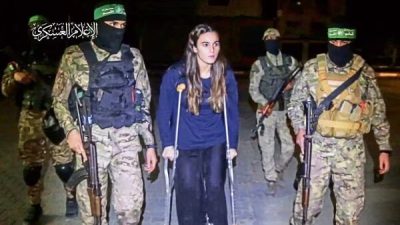Israel to Tell Blinken Palestinians Can’t Return to North Gaza Without Hostage Deal

All Global Research articles can be read in 51 languages by activating the Translate Website button below the author’s name (only available in desktop version).
To receive Global Research’s Daily Newsletter (selected articles), click here.
Click the share button above to email/forward this article to your friends and colleagues. Follow us on Instagram and Twitter and subscribe to our Telegram Channel. Feel free to repost and share widely Global Research articles.
New Year Donation Drive: Global Research Is Committed to the “Unspoken Truth”
***
Israeli officials will tell Secretary of State Tony Blinken on Tuesday that Israel won’t allow Palestinians to return to northern Gaza if Hamas doesn’t agree to release more hostages, according to two senior Israeli officials.
The big picture: Making progress toward the return of Palestinians to their homes and ensuring they are not forcibly displaced from Gaza is one of the goals of Blinken’s talks in Israel this week.
- The Biden administration has expressed concerns over recent statements from some radical right-wing Israeli ministers who have called for Palestinians to be driven out of the Strip.
What they’re saying: “Palestinian civilians must be able to return home as soon as conditions allow,” Blinken said on Sunday in a press conference with the Qatari prime minister in Doha.
- “They cannot and they must not be pressed to leave Gaza,” he stressed.
Behind the scenes: The Israeli sources told Axios that while Israel doesn’t in principle oppose allowing Palestinians to return to northern Gaza, officials will tell Blinken such a move needs to be part of a new hostage deal.
- “We are not going to allow Palestinians to go back to their homes in northern Gaza if there is no progress with the release of hostages,” one senior Israeli official said.
- Israeli negotiators who are working on the issue believe the return of Palestinians to northern Gaza is significant leverage that Israel doesn’t want to give up as it tries to secure a new hostage deal, a second Israeli official said.
- “There are Israeli and American hostages that are still held in Gaza. We think we will know within a few weeks whether a new deal to release them is possible or not,” the second official said.
- The Israeli Ministry of Defense declined to comment.
Driving the news: IDF spokesperson Daniel Hagari said on Monday that the Israeli military is in the process of transitioning from high-intensity operations in most of the Gaza Strip to low-intensity operations. This means there will be fewer ground forces inside the enclave and fewer air strikes, especially in Gaza City and in the northern Gaza Strip.
- High-intensity fighting is expected to continue in the southern city of Khan Younes where the IDF is still searching for Hamas leaders who Israel believes are hiding in the tunnels.
Zoom out: Blinken said on Sunday that the IDF’s transition to a lower-intensity phase of its military operation will allow the UN to evaluate what needs to be done to allow displaced Palestinians to return to the north.
- A senior Israeli official said both Israel and the U.S. understand that a return to the north will not happen in the short term because fighting continues in some areas and due to the conditions.
- But Israeli officials are expected to tell Blinken they are ready to start the planning process with the U.S. and the UN for a future return of Palestinians to their homes, if possible, or to shelters established by international organizations, the official said.
Zoom in: Up to 1.9 Palestinians — 85% of the population — in the tiny enclave have been displaced by the Israeli military campaign that began after the Oct. 7 Hamas attack on Israel, according to the UN Palestinian refugee agency, which stresses that many have been forced to move multiple times.
- Hundreds of thousands of Palestinians fled northern Gaza after repeated evacuation orders by Israel and the start of the military’s ground offensive. Many will have no physical homes to return to, as destruction from Israel’s bombardment is widespread.
- Between 70% and 80% of buildings in northern Gaza have been destroyed in the war, according to an analysis of satellite data conducted by Jamon Van Den Hoek of Oregon State University and Corey Scher of CUNY Graduate Center. Much of northern Gaza’s water, sanitation electricity infrastructure has also been destroyed.
State of play: Blinken met with Emirati President Sheikh Mohammed bin Zayed in Abu Dhabi on Wednesday, before traveling to Saudi Arabia to meet with Crown Prince Mohammed bin Salman.
- Blinken’s talks with regional leaders are aimed at preventing the spread of the Gaza war to Lebanon and other parts of the Middle East, the State Department said.
- But on Monday, the situation along the Israel-Lebanon border escalated further with the killing of senior Hezbollah field commander Wissam al-Tawil, who helped lead the group’s elite Radwan force. Israel didn’t claim responsibility for the strike but Israeli officials said they are preparing for a significant retaliation by Hezbollah.
*
Note to readers: Please click the share button above. Follow us on Instagram and Twitter and subscribe to our Telegram Channel. Feel free to repost and share widely Global Research articles.
Featured image: Hamas hostage release (Source)

